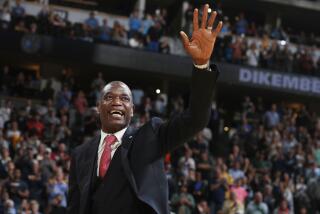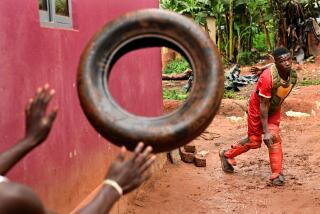Manute Bol dies at 47; towering NBA player provided aid to his native Sudan
- Share via
Manute Bol, who was one of the tallest players in NBA history and gained stature off the court for his efforts to save lives in his homeland of Sudan, has died. He was 47.
Bol died Saturday at the University of Virginia Medical Center in Charlottesville, a spokeswoman said. She did not comment on a cause of death.
Tom Prichard, executive director of the group Sudan Sunrise, told the Associated Press that Bol was being treated for severe kidney trouble and a painful skin condition.
“Sudan and the world have lost a hero and an example for all of us,” Prichard said.
Bol was a 7-foot-6 curiosity when he was drafted in 1985 by the then-Washington Bullets. He was so thin that during his rookie season then-Dallas coach Dick Motta told the Washington Post that Bol would “break like a grasshopper … an arm here, a leg over there” once he ran into a typical NBA opponent.
But Bol lasted 10 seasons, playing for four teams. His enormous wingspan made blocking shots his specialty, and he set a record with 397 blocks his first season.
“He made a career out of something that people saw in the beginning as a circus act,” Chris Mullin, a close friend and former teammate, told the New York Daily News in 2004.
Bol’s most lasting legacy may be his efforts to use his celebrity to improve conditions in war-torn Sudan.
“God guided me to America and gave me a good job,” he told Sports Illustrated in 2004. “But he also gave me a heart so I would look back.”
He was born Oct. 16, 1962, in Gogrial, Sudan, and had a biography unmatched by the backgrounds of any of his fellow NBA players. A member of the Dinka tribe and the descendant of chiefs, Bol once killed a lion with a spear while herding cows.
Don Feeley, who coached at Fairleigh Dickinson University, found Bol in 1982 at a coaching clinic in Sudan. The then-San Diego Clippers drafted Bol in 1983 before he had even played in college. Bol eventually enrolled at the University of Bridgeport, a Division II school in Connecticut. He played one season and then signed with a summer pro league in Rhode Island before being drafted by Washington.
As a rookie in Washington, Bol got a chance to play regularly when starting center Jeff Ruland was hurt. He started 60 games that season, which would be a career high.
Bol spent three seasons in Washington before being traded to the Golden State Warriors. After two seasons there, he was dealt to the Philadelphia 76ers, where he played for three seasons. Bol spent the 1993-94 season with Miami, Washington and Philadelphia. He played five games for Golden State in the 1994-95 season.
He used his NBA career to support his extended family and relief efforts in Sudan.
“I don’t like war,” he told the New York Times in 2001. “I used to, but not anymore.”
But Bol’s finances collapsed after he left the NBA, in part from the millions he spent on Sudan and in part from investments that went bad.
“He always did a lot for his people,” Warriors coach Don Nelson told the Montreal Gazette in 2002. “He gave his own money to support his people who were starving.”
Trying to raise money for Sudan, Bol took part in stunts such as fighting former Chicago Bears lineman William “Refrigerator” Perry in a televised boxing match.
Ed Stefanski, 76ers president and general manager, said in a statement Saturday that Bol “was continually giving of himself through his generosity and humanitarian efforts in order to make the world around him a much better place.”
Bol, who was seriously injured in a car accident in 2004, was hospitalized in May after returning to the United States from Sudan. He was helping build a school with Sudan Sunrise, a humanitarian group based in Kansas, but stayed longer than expected after the president of southern Sudan asked him to make election appearances, Prichard told the Associated Press.
“I never thought about the money I lost,” Bol told the New York Daily News in 2004. “It wasn’t lost. It helped Sudan.”
A complete list of survivors was not available.
More to Read
Start your day right
Sign up for Essential California for the L.A. Times biggest news, features and recommendations in your inbox six days a week.
You may occasionally receive promotional content from the Los Angeles Times.






